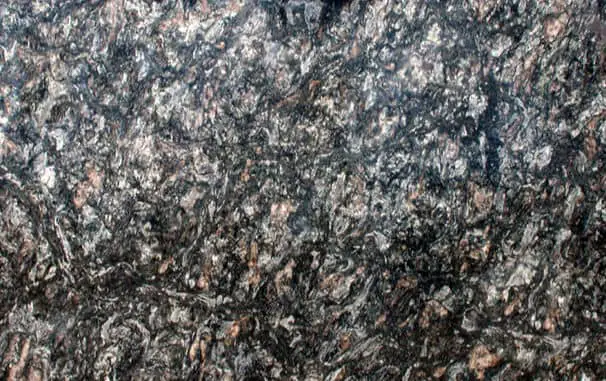Caring for Metallicus Granite
QUESTION:
My wife and I are very interested in a granite countertop slab named "Metallicus".It is a dark granite with what I call rivers of silver and gold across it. It seems to have a high metallic content or at least has that appearance.

One prospective fabricator said that we should be wary of the metal content as it can "ionize" upon exposure to water.
As it seems this granite is a lot more expensive than what we really wanted to spend but we are considering it. I'd like to make sure that there are no pitfalls to using it as our kitchen countertop.
- Are you familiar with Metallicus granite?
- Does the high metals content have any negative affect with water?
- With granite such as these are there issues in polishing edges? We like the ogee edge.
- Are there 15 year sealers that have warranties?
My friend had his granite sealed and he has a written warranty form the manufacturer. Thanks for your insights!
ANSWER:
Oxidation could be an issue with Metallicus granite (also commonly spelled "Metalicus").Any granite countertop or stone with metal in it could be susceptible to oxidation upon contact with water creating a maintenance issue.
You see this with white marble floors and showers when not installed properly or if flooded.
The constant exposure to water oxidizes the small deposits in the marble, which then bleeds through to the surface causing rust stains.
This is usually not a problem with granite countertop maintenance, since essentially all sides are open to air and cannot trap water so the stone is never exposed to water long enough to oxidize any metal.
And some metals will oxidize (like iron) upon exposure to air. Various metals react differently when oxidizing too. Iron develops brown crust. Copper develops a green patina.
I would say that if the metal in the stone is right on the surface, then oxidation is
If the stone has been "resined", which is a permanent coating applied at the factory, then it should help shield the metal from contact with air.
Metal deeper in the stone probably isn't a worry because you'll never be able to saturate the stone with water.
Cutting the Metalicus granite slab will expose the edges and remove any resin if present and could expose metal which may oxidize.
Metallicus granite countertops tend to more difficult to fabricate and install as well. Many granite fabricators do not like working with Metallicus.
Cracks in granite can occur and these slabs often break when cutting or during installation even with excellent care. Also, the metals seem to continually flake off on some slabs.
Regarding sealers: There are a couple next generation sealers that carry a 15-year warranty when applied by a licensed technician or if you purchase the stone that has been pre-treated.
PermaShield is one, but I'd consider SenGuard by Silestone as the leader here.
We recommend these top-quality sealers which are very durable.
When Senguard is applied by the homeowner, you don't get the warranty, but you'll still get as good of protection.
You'll pay more for professional application and get the warranty, but it is very unlikely that you'd ever need to use the warranty... so it just becomes an additional maintenance cost. It's a decision you'd have to make.
Although a sealer may provide some protection against possible oxidation, I highly doubt the warranty would cover possible oxidation if that's what you are wondering.
Sealers protect against staining... something absorbing into the stone and these warranties have stipulations that you must do this and not that or the warranty is void.
And a Metallicus granite countertop may be to dense to absorb a sealer anyway.
Comments for Caring for Metallicus Granite
|
||
|
||
|
||
|
||


